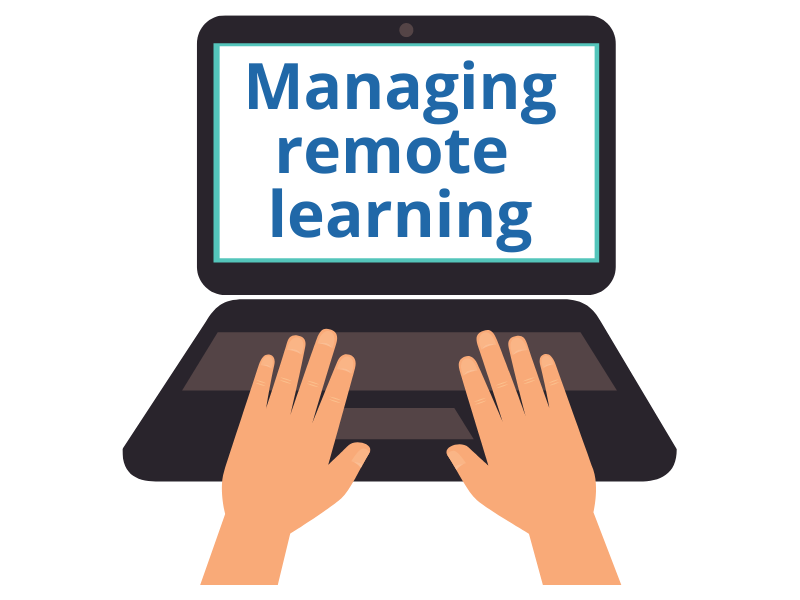Remote learning has challenged many families across Australia. What can be done to better support our children with disability to learn under lockdown?

On this page, you’ll find some ideas that our families came up with.
Engagement in Zoom calls with class
- Make classes/meetings mobile, eg. take them outside
- Make engagement in Zoom calls fun – make the main screen the video image of the child who if they are curious and interested in their own image – add glasses, hat and other items to make it more fun – this may lead to more interaction from peers as a conversation starter.
- Use of predictable software to help form sentences for communication. e.g. Predictable app
- Software that voice corrects to allow others to understand spoken words of students who can’t pronounce correctly – e.g. https://www.techradar.com/au/news/best-speech-to-text-app
Managing the need to report back to the school
It is extra work for parents and students to report back differing activities being completed when these don’t align with the set tasks.
- Suggest to school to have the support teacher join existing meetings rather than having to do this in an additional time.
- Suggesting to school to use a support teacher to print worksheets for the week and organise in a work folder so it can be picked up each week/fortnight (This would help the family manage the actual work rather than spending time on creating and printing resources. (Some schools are already doing this.)
- Follow the interests and abilities of the student, think about the real goal of the session, eg. if the teacher has assigned skipping for PE and this isn’t something the student enjoys or wants to engage with complete an alternate physical activity (see below for some ideas)
Exercise ideas
- Goyoyo Tabata workouts (simple and 15/20 minutes)
- Cosmic Kids Yoga
- Family exercise options – walking, bike riding, scooter etc.
- Dance videos
- PE with Joe (on youtube)
- Walk for a purpose
- Buy something at the shops (Remember your mask)
- Geocaching
- Take a photo of a tree and take it with you each time you go for a walk and look at the changes
- Take photos of the same scene each day and see how it changes
- Microscopic videos – use an app or extension to your phone that records magnified images. Connect to the TV and watch later at home.
- Maintain a journal on your findings in an area of interest (e.g If interested in COVID-19 data, conduct trend analysis or it could be how many steps each family member did every day)
- If the family is competitive, come up with a motivating challenge for everyone… (e.g. Weekly Top steps achiever gets to choose a movie to watch on movie day )
- Take part in some community initiatives – Where’s Wally in people’s windows, finding and distributing painted rocks
Supplement school tasks with fun educational activities
- Watching science and geography videos etc to supplement the literacy and numeracy focus of his school time. For example, National Geographic Kids resources
- Going on virtual tours
- Set a reward of watching a video for enjoyment after watching educational videos (www.kidslearningtube.com)
- Videos on puberty – for high school PE
Maintain social connections for school-aged family members
- Set up some zoom/snapchat/skype etc calls where they can do a fun activity together. Be sure to have an activity planned for the session. Some ideas are:
- Dance
- Sing
- Tell jokes
- Show their artwork/baking etc.
- Trampoline tricks/routines
- Origami
- Board Games (chess/battleship if only two are participating)
- Sharing of videos/photos of activities/creations
- Trampoline routines
- Musical performances
- Lego creations
- artworks
- Set up virtual meetings for friends
- Look for shared interests as a point of connection
- Looking to school peers but also at other communities – our local neighbourhood…
Some things you can try while in lockdown to connect with your neighbours
- Write a note to let them know you are there
- Cook some biscuits to share
- Leave out some lemons from your lemon tree for people to take
- Look out for your elderly neighbours – do they need you to drop off some food?
- Leave a roll of toilet paper with a note of kindness
- Highly recommended: Read this article by Hugh Mackay on Kindness: A Cure for Loneliness?
Prioritise everyone’s mental health (students and parents)
- Be flexible – Flexible timings, activities, breaks
- Spend time outside daily
- Lower expectations for finishing academic tasks, eg for tasks not getting great engagement or tasks where there is a lot of resistance – move on
- Working parents sharing break times with children
- Allow time to focus on the things the student enjoys, eg. puzzles – these activities can free up time for parents.
- Set up zoom chats with Grandparents
Schedule/ structuring the day
- Keep to the structure and routine as much as possible so expectations are clear and students know what the day will look like.
- Wake up and bedtime kept the same
- Use a whiteboard to schedule day or if you have existing visuals use them (keep it simple)
- Include breaks in the schedule
- Have a basic checklist – eg. 6 things to do today (maths, literacy…) Once the checkboxes are complete, school is complete and there’s time for other fun activities.
- Use of timers to transition to the next activity.
- Separate space to do school work with everything needed at hand (stationary, headphones etc)
- Fruit and water close by
- Expecting boundaries to be respected when it comes to parent work commitments (the use of visuals and social stories may help)
Build household tasks into the day
- This is a great time for this learning opportunity
- Opportunities for incidental learning from parents and siblings
- Give children time to cook, select meals and learn new skills around the house – finding this is brightening up their day more than anything else!
- Educational aspects can be included in household tasks like cooking – science and maths.
- Making things fun – parent skipping steps or ingredients to encourage engagement and enjoyment
Helpful websites
- CRU(Community Resource Unit- QLD) Remote Learning document
- Educational material – relevant for all ages – https://www.abc.net.au/education/
- Maths videos: great maths resource explaining maths concepts visually:
- Listen to storybooks being read by actors (Pre-School and Primary)


